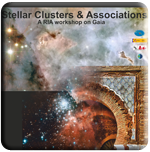The ALHAMBRA Survey
Moles, M.; Aguerri, J. A. L.; Alfaro, E. J.; Benítez, N.; Broadhurst, T.; Cabrera-Caño, J.; Castander, F. J.; Cepa, J.; Cerviño, M.; Fernández Soto, A.; González Delgado, R. M.; Infante, L.; Martínez, V. J.; Masegosa, J.; Márquez, I.; Del Olmo, A.; Perea, J.; Prada, F.; Quintana, J. M.; Sánchez, S. F.
Pathways Through an Eclectic Universe ASP Conference Series, Vol. 390, proceedings of the conference held 23-27 April, 2007 at Santiago del Teide, Tenerife, Spain. Edited by J. H. Knapen, T. J. Mahoney, and A. Vazdekis San Francisco: Astronomical Society of the Pacific, 2008., p.495
06/2008
ABSTRACT
ALHAMBRA is a survey of eight separate regions of the sky with a total area of 4 sq. deg. The fields are observed with the LAICA (visible) and OMEGA-2000 (near infrared) cameras mounted on the 3.5 m telescope of CAHA observatory. The survey is done with a set of 20 adjacent medium-band filters that cover the visible range. These filters, together with three standard near-infrared ones, allow for a detailed measurement of the spectral energy distribution and redshift of a multitude of objects, stretching over an unprecedented range of distances for such a large-area survey. In particular, the basic motivation of the whole ALHAMBRA project is the cosmic evolution of galaxies. ALHAMBRA has been designed to cover the niche between deep pencil-beam surveys, which are necessarily restricted to small areas, and large-area shallow surveys that only probe the local Universe. The project enjoys Spanish guaranteed observing time status at the Calar Alto facilities. In this poster, we present the project and the first results obtained.


